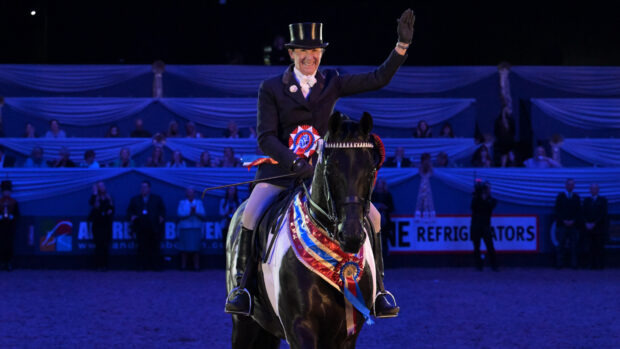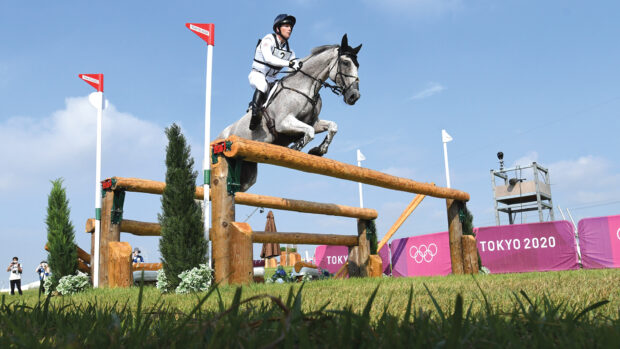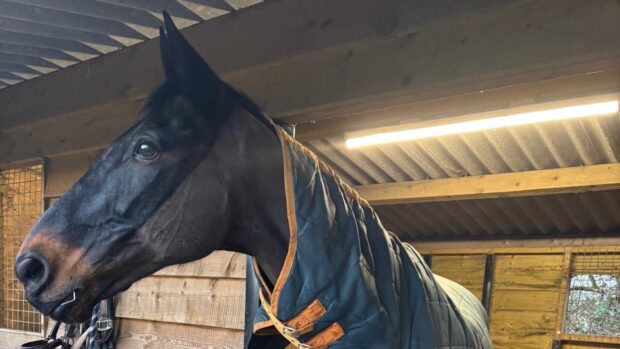Have you ever shared a warm-up with a Whitaker, or perhaps your eventing section includes a British Olympic medallist? Equestrian sport is unusual in that you can find yourself competing alongside your idols, which in one breath can feel awe-inspiring, and in another a curse when that leads to self-doubt. If you have ever found yourself at a show and questioning your right to be there, it could be that you’re experiencing impostor syndrome.
Clinical psychologist Dr Krissie Ivings of Aspire Rider Confidence & Hypnotherapy and author of Tame the Chimp, Shoot the Parrot & Silence the Mouse explains that while impostor syndrome is not a clinical condition, it is a well-recognised experience that can be very common in athletes and certain professions.
“Impostor syndrome is the term used when people do not feel as though they’re qualified to be doing what they’re doing, or a feeling that they’re not in the right place,” Krissie explains. “You might feel like a fraud, or a fake, and that you’re going to get found out.
“In riding it might be that you feel like you shouldn’t be entering a certain competition, or that level. When it goes right you might feel like you’ve fluked it or gotten away with it – but if it goes badly then you feel like you were never good enough in the first place.”
{"content":"PHA+SW1wb3N0b3Igc3luZHJvbWUgY2FuIGZlZWwgbGlrZSBhbiBvbmdvaW5nIG5lZ2F0aXZlIGNvbnZlcnNhdGlvbiB0YWtpbmcgcGxhY2UgaW4geW91ciBoZWFkLjwvcD4KPHA+PHNlY3Rpb24gaWQ9ImVtYmVkX2NvZGUtMzEiIGNsYXNzPSJoaWRkZW4tbWQgaGlkZGVuLWxnIHMtY29udGFpbmVyIHN0aWNreS1hbmNob3IgaGlkZS13aWRnZXQtdGl0bGUgd2lkZ2V0X2VtYmVkX2NvZGUgcHJlbWl1bV9pbmxpbmVfMiI+PHNlY3Rpb24gY2xhc3M9InMtY29udGFpbmVyIGxpc3RpbmctLXNpbmdsZSBsaXN0aW5nLS1zaW5nbGUtc2hhcmV0aHJvdWdoIGltYWdlLWFzcGVjdC1sYW5kc2NhcGUgZGVmYXVsdCBzaGFyZXRocm91Z2gtYWQgc2hhcmV0aHJvdWdoLWFkLWhpZGRlbiI+DQogIDxkaXYgY2xhc3M9InMtY29udGFpbmVyX19pbm5lciI+DQogICAgPHVsPg0KICAgICAgPGxpIGlkPSJuYXRpdmUtY29udGVudC1tb2JpbGUiIGNsYXNzPSJsaXN0aW5nLWl0ZW0iPg0KICAgICAgPC9saT4NCiAgICA8L3VsPg0KICA8L2Rpdj4NCjwvc2VjdGlvbj48L3NlY3Rpb24+PC9wPgo8cD7igJxJIHVzZSB0aGUgbWV0YXBob3Igb2YgdGhlIHBhcnJvdCB3aGljaCBzaXRzIG9uIHlvdXIgc2hvdWxkZXIgYW5kIHNheXMgbmVnYXRpdmUgdGhpbmdzIGluIHlvdXIgZWFyIGxpa2UsIOKAmEV2ZXJ5b25l4oCZcyBsYXVnaGluZywgSeKAmW0gZW1iYXJyYXNzaW5nIG15c2VsZiwgSSBzaG91bGRu4oCZdCBiZSBoZXJl4oCZLOKAnSBzYXlzIEtyaXNzaWUuPC9wPgo8cD7igJxUaG9zZSB0aG91Z2h0cyBhcmUgbm90IHRydWUsIHRoZXnigJlyZSBhbiB1bmhlbHBmdWwgY29udmVyc2F0aW9uLiBObyBvbmUgd291bGQgZXZlciBzYXkgdGhvc2UgdGhpbmdzIHRvIHlvdSwgYW5kIGEgcnVsZSBvZiB0aHVtYiB0byBnbyBieSBpcywgaWYgeW91IHdvdWxkbuKAmXQgc2F5IGl0IHRvIHlvdXIgZnJpZW5kIHRoZW4gZG9u4oCZdCBzYXkgaXQgdG8geW91cnNlbGYu4oCdPC9wPgo8aDI+RGVhbGluZyB3aXRoIGltcG9zdG9yIHN5bmRyb21lOiDigJxJIGhhZCB0byBsZWFybiB0byBiZSBraW5kZXIgdG8gbXlzZWxm4oCdPC9oMj4KPHA+RGVudGlzdCBhbmQgc3VjY2Vzc2Z1bCBhbWF0ZXVyIGV2ZW50ZXIgSm9kaWUgTmVpbGwgaGFzIHN0cnVnZ2xlZCB3aXRoIGltcG9zdG9yIHN5bmRyb21lLiBKb2RpZSB3YXMgY29tcGV0aW5nIGF0IENDSTMqIGxldmVsIGFuZCB3YXMgdHJhaW5pbmcgdG93YXJkcyBmb3VyLXN0YXIgcHJpb3IgdG8gaGVyIG1hcmUgUXVhbnR1bSBDbG92ZXIgR29sZCAoUG9wcykgbmVlZGluZyBzb21lIHRpbWUgb3V0IHRvIHJlY292ZXIgZnJvbSBhbiBpbmp1cnksIHdoaWxlIEpvZGllIHdlbnQgb24gdG8gaGF2ZSBhIGJhYnkuPC9wPgoKPHA+4oCcSSBkaWRu4oCZdCBzdGFydCBldmVudGluZyB1bnRpbCBhcm91bmQgMjUgYW5kIFBvcHMgd2FzIG15IGZpcnN0IGhvcnNlIOKAkyBzaGUgZGlkbuKAmXQgY29zdCBhIGxvdCBvZiBtb25leSBhbmQgSSBuZXZlciByZWFsbHkgaGFkIGV4cGVjdGF0aW9ucyBvZiBnZXR0aW5nIHVwIHRoZSBsZXZlbHMs4oCdIHNheXMgSm9kaWUuIOKAnEJ1dCB3ZSBkaWQsIGFuZCBhbGwgb2YgYSBzdWRkZW4gSSB3YXMgYXQgdGhlIGJpZyBldmVudHMgd2FybWluZyB1cCB3aXRoIE9seW1waWMgcmlkZXJzIGFuZCBwcm9mZXNzaW9uYWxzLjwvcD4KPHA+4oCcT24gb25lIG9jY2FzaW9uIGF0IEdhdGNvbWJlLCB0aGUgY3Jvc3MtY291bnRyeSBjb3Vyc2UgaGFkIGNhdXNlZCBjYXJuYWdlIGFuZCBJIHdhcyBoZWFyaW5nIG9uIHRoZSBjb21tZW50YXJ5IHRoYXQgYmlnIG5hbWVzIHdlcmUgcmV0aXJpbmcgYW5kIHdhbGtpbmcgaG9tZS4gSSByZW1lbWJlciB0aGlua2luZyDigJhXaGF0IG9uIGVhcnRoIGFtIEkgZG9pbmcgaGVyZT\/igJkuPC9wPgoKPHA+4oCcVGhhbmtmdWxseSBJIGhhZCBzdXBwb3J0IGZyb20gbXkgY29hY2ggSmFtZXMgT2FrZGVuLCBiZWNhdXNlIG90aGVyd2lzZSBJ4oCZZCBwcm9iYWJseSBoYXZlIGRyaXZlbiB0aGUgMTAgaG91cnMgaG9tZS4gSSBqdXN0IGRpZG7igJl0IGJlbGlldmUgd2Ugd2VyZSBnb2luZyB0byBiZSBjYXBhYmxlLCBJIGZlbHQgbGlrZSwg4oCYSWYgdGhleSBjb3VsZG7igJl0IGRvIGl0LCBob3cgb24gZWFydGggY291bGQgST8gSeKAmW0gYSBkZW50aXN0LCB0aGV54oCZcmUgcHJvZmVzc2lvbmFsc+KAmS7igJ08L3A+CjxwPjxkaXYgaWQ9ImF0dGFjaG1lbnRfODk0OTY2IiBzdHlsZT0id2lkdGg6IDE0MTBweCIgY2xhc3M9IndwLWNhcHRpb24gYWxpZ25ub25lIj48aW1nIGZldGNocHJpb3JpdHk9ImhpZ2giIGRlY29kaW5nPSJhc3luYyIgYXJpYS1kZXNjcmliZWRieT0iY2FwdGlvbi1hdHRhY2htZW50LTg5NDk2NiIgY2xhc3M9Imxhenlsb2FkIGJsdXItdXAgc2l6ZS1mdWxsIHdwLWltYWdlLTg5NDk2NiIgZGF0YS1wcm9jZXNzZWQgc3JjPSJodHRwczovL2tleWFzc2V0cy50aW1laW5jdWsubmV0L2luc3BpcmV3cC9saXZlL3dwLWNvbnRlbnQvdXBsb2Fkcy9zaXRlcy8xNC8yMDE3LzAzL25ldy1oaC1wbGFjZWhvbGRlci0yMDB4MjAwLnBuZyIgZGF0YS1zcmM9Imh0dHBzOi8va2V5YXNzZXRzLnRpbWVpbmN1ay5uZXQvaW5zcGlyZXdwL2xpdmUvd3AtY29udGVudC91cGxvYWRzL3NpdGVzLzE0LzIwMjUvMDYvSEFIMDAubGJfc3RvY2thdXR1bW4yMS5JTUdfNTM0OC5qcGciIGFsdD0iUmlkZXJzIGluIHdhcm0tdXAgYXQgaG9yc2UgdHJpYWxzIiB3aWR0aD0iMTQwMCIgaGVpZ2h0PSI3ODgiIGRhdGEtc2l6ZXM9ImF1dG8iIGRhdGEtc3Jjc2V0PSJodHRwczovL2tleWFzc2V0cy50aW1laW5jdWsubmV0L2luc3BpcmV3cC9saXZlL3dwLWNvbnRlbnQvdXBsb2Fkcy9zaXRlcy8xNC8yMDI1LzA2L0hBSDAwLmxiX3N0b2NrYXV0dW1uMjEuSU1HXzUzNDguanBnIDE0MDB3LCBodHRwczovL2tleWFzc2V0cy50aW1laW5jdWsubmV0L2luc3BpcmV3cC9saXZlL3dwLWNvbnRlbnQvdXBsb2Fkcy9zaXRlcy8xNC8yMDI1LzA2L0hBSDAwLmxiX3N0b2NrYXV0dW1uMjEuSU1HXzUzNDgtMzAweDE2OS5qcGcgMzAwdywgaHR0cHM6Ly9rZXlhc3NldHMudGltZWluY3VrLm5ldC9pbnNwaXJld3AvbGl2ZS93cC1jb250ZW50L3VwbG9hZHMvc2l0ZXMvMTQvMjAyNS8wNi9IQUgwMC5sYl9zdG9ja2F1dHVtbjIxLklNR181MzQ4LTYzMHgzNTUuanBnIDYzMHcsIGh0dHBzOi8va2V5YXNzZXRzLnRpbWVpbmN1ay5uZXQvaW5zcGlyZXdwL2xpdmUvd3AtY29udGVudC91cGxvYWRzL3NpdGVzLzE0LzIwMjUvMDYvSEFIMDAubGJfc3RvY2thdXR1bW4yMS5JTUdfNTM0OC0xMzV4NzYuanBnIDEzNXcsIGh0dHBzOi8va2V5YXNzZXRzLnRpbWVpbmN1ay5uZXQvaW5zcGlyZXdwL2xpdmUvd3AtY29udGVudC91cGxvYWRzL3NpdGVzLzE0LzIwMjUvMDYvSEFIMDAubGJfc3RvY2thdXR1bW4yMS5JTUdfNTM0OC0zMjB4MTgwLmpwZyAzMjB3LCBodHRwczovL2tleWFzc2V0cy50aW1laW5jdWsubmV0L2luc3BpcmV3cC9saXZlL3dwLWNvbnRlbnQvdXBsb2Fkcy9zaXRlcy8xNC8yMDI1LzA2L0hBSDAwLmxiX3N0b2NrYXV0dW1uMjEuSU1HXzUzNDgtNjIweDM0OS5qcGcgNjIwdywgaHR0cHM6Ly9rZXlhc3NldHMudGltZWluY3VrLm5ldC9pbnNwaXJld3AvbGl2ZS93cC1jb250ZW50L3VwbG9hZHMvc2l0ZXMvMTQvMjAyNS8wNi9IQUgwMC5sYl9zdG9ja2F1dHVtbjIxLklNR181MzQ4LTkyMHg1MTguanBnIDkyMHcsIGh0dHBzOi8va2V5YXNzZXRzLnRpbWVpbmN1ay5uZXQvaW5zcGlyZXdwL2xpdmUvd3AtY29udGVudC91cGxvYWRzL3NpdGVzLzE0LzIwMjUvMDYvSEFIMDAubGJfc3RvY2thdXR1bW4yMS5JTUdfNTM0OC0xMjIweDY4Ny5qcGcgMTIyMHciIHNpemVzPSIobWF4LXdpZHRoOiAxNDAwcHgpIDEwMHZ3LCAxNDAwcHgiIC8+PHAgaWQ9ImNhcHRpb24tYXR0YWNobWVudC04OTQ5NjYiIGNsYXNzPSJ3cC1jYXB0aW9uLXRleHQiPlJ1YmJpbmcgc2hvdWxkZXJzIHdpdGggdG9wIHJpZGVycyBpbiB0aGUgY29sbGVjdGluZyByaW5nIGNhbiBleGFjZXJiYXRlIHRoZSBmZWVsaW5ncyBvZiBpbXBvc3RvciBzeW5kcm9tZS4gQ3JlZGl0OiBTb3BoaWUgQ2hlZXNlbWFuPC9wPjwvZGl2PjxiciAvPgo8L3A+CjxwPkpvZGllIHNheXMgaGF2aW5nIHN1cHBvcnQgYXJvdW5kIGhlciB3YXMga2V5LjwvcD4KPHA+4oCcSSB0aGluayB3aXRob3V0IHRob3NlIHBlb3BsZSBpbiB5b3VyIGxpZmUsIHRoYXQgc29ydCBvZiBtZW50b3ItdHlwZSBwZW9wbGUsIGl04oCZcyByZWFsbHkgaGFyZCBiZWNhdXNlIHlvdSBjYW4gZ2V0IGxvc3QgaW4geW91ciBvd24gaGVhZCBhbmQgdGhpbmsgeW91IGRvbuKAmXQgZGVzZXJ2ZSB0byBiZSB0aGVyZSBhbmQgdGhhdCB5b3XigJlyZSBnb2luZyB0byBnZXQgY2F1Z2h0IG91dCzigJ0gc2hlIHNheXMsIGFkZGluZyB0aGF0IHNoZSBhbHNvIHNvdWdodCBoZWxwIGZyb20gYSBzcG9ydHMgcHN5Y2hvbG9naXN0IGFuZCBoYWQgaHlwbm90aGVyYXB5LjwvcD4KPHA+4oCcSSBuZXZlciBjdXJlZCB0aGUgaW1wb3N0b3Igc3luZHJvbWUsIGJ1dCBJIGZlbHQgbW9yZSBjb21mb3J0YWJsZSBhbmQgc3RhcnRlZCB0byBiZWxpZXZlIHRoYXQgd2UgY291bGQgZG8gaXQs4oCdIGFkZHMgSm9kaWUsIHdobyBpcyBub3cgcHJvZHVjaW5nIGEgeW91bmcgaG9yc2UgdG8gZXZlbnQuPC9wPgo8cD7igJxGb3IgbWUsIGl0IHdhcyBoYXZpbmcgc29tZSBhY2NlcHRhbmNlIHRoYXQgSeKAmW0gbm90IHRoZSBzYW1lIGFzIGEgcHJvZmVzc2lvbmFsIHJpZGVyLiBTb21lb25lIG9uY2Ugc2FpZCB0byBtZSwg4oCZQ291bGQgYW4gZXZlbnRlciBnbyBhbmQgYmUgYSBkZW50aXN0IGZyb20gTW9uZGF5IHRvIEZyaWRheT\/igJkg4oCTIEkgaGFkIHRvIGxlYXJuIHRvIGJlIGtpbmRlciB0byBteXNlbGYgYW5kIG5vdCBleHBlY3QgdG8gbmVjZXNzYXJpbHkgYmUgYWJsZSB0byByaWRlIGFuZCBwcm9kdWNlIGhvcnNlcyB0aGUgd2F5IGEgcHJvZmVzc2lvbmFsIG1pZ2h0LuKAnTwvcD4KPHA+RnJlZWxhbmNlIGNvYWNoIEZpb25hIElzemNoYWsgY29tcGV0ZXMgaW4gc2hvd2p1bXBpbmcgYW5kIG9mdGVuIGZpbmRzIGhlcnNlbGYgaW4gY2xhc3NlcyB3aXRoIHByb2Zlc3Npb25hbCB3ZWxsLWtub3duIHJpZGVycy48L3A+CjxwPuKAnEkgaGF2ZSBpbXBvc3RvciBzeW5kcm9tZSByZWd1bGFybHksIGFuZCBvbmUgb2YgbXkgY2xpZW50cyBvbmNlIHNhaWQg4oCYQnV0IGFyZW7igJl0IHlvdSBhIHByb2Zlc3Npb25hbD\/igJnigJ0gc2hlIHNheXMuIOKAnEl0IG1hZGUgbWUgc3RvcCBhbmQgdGhpbmssIOKAmFdlbGwsIEkgc3VwcG9zZSBJIGFt4oCZLiBJIGhhZG7igJl0IHRob3VnaHQgb2YgbXlzZWxmIHRoYXQgd2F5IGJlY2F1c2UgSSBkb27igJl0IHNob3dqdW1wIGZvciBhIGpvYiBvciBoYXZlIGZhbmN5IGhvcnNlcy48L3A+CjxwPuKAnFlvdSBjYW4gZmluZCB5b3Vyc2VsZiB0aGlua2luZyBJIGRvbuKAmXQgZGVzZXJ2ZSB0byBiZSBoZXJlOyBJIGhhdmVu4oCZdCBnb3QgdGhlIGJpZyBsb3JyeSBvciBkZXNpZ25lciBzYWRkbGUsIGJ1dCB5b3UgY2FuIHN0aWxsIGdvIGFuZCB3aW4gdGhlIGNsYXNzLCBzbyBzb21ldGltZXMgeW91IG5lZWQgdG8gZ2l2ZSB5b3Vyc2VsZiBhIHJlYWxpdHkgY2hlY2suPC9wPgo8cD7igJxJdCBjYW4gYmUgZWFzeSB0byBwcmVzdW1lIHlvdeKAmXJlIHRoZSBvbmx5IG9uZSBmZWVsaW5nIGxpa2UgdGhhdCwgYnV0IHRoZXJl4oCZcyBwcm9iYWJseSBsb3RzIG9mIHBlb3BsZSBpbiB0aGUgc2FtZSBib2F0IGFzIHlvdS7igJ08L3A+CjxoMj5JbXBvc3RvciBzeW5kcm9tZSBjYW4gaGFwcGVuIHRvIGFueW9uZTwvaDI+CjxwPkRyIENsYWlyZSBCZW5uZXR0IG9mIFJpZGluZyBNaW5kZnVsbHksIGEgY2xpbmljYWwgcHN5Y2hvbG9naXN0IGFuZCBVS0NDIGxldmVsIDIgZHJlc3NhZ2UgY29hY2gsIHNheXMgaW1wb3N0b3Igc3luZHJvbWUgY2FuIG9jY3VyIGluIGFsbCB3YWxrcyBvZiBsaWZlIGFuZCBvZnRlbiBzdGVtcyBmcm9tIHdoZXJlIHRoZXJlIGlzIGEgcHJlc3N1cmUgdG8gcGVyZm9ybS48L3A+CjxwPuKAnFRoZSBicmFpbiBwZXJjZWl2ZXMgdGhlIHRob3VnaHQgb2YgYmVpbmcgZm91bmQgb3V0IGFzIGhpZ2hseSB0aHJlYXRlbmluZyzigJ0gQ2xhaXJlIGV4cGxhaW5zLiDigJxJdOKAmXMgbm90IGEgY2hvaWNlIHRvIGZlZWwgYW54aW91cywgYnV0IGFuIGF1dG9tYXRpYyBmaWdodC1mbGlnaHQtZnJlZXplIHJlc3BvbnNlLjwvcD4KPHA+4oCcQW54aWV0eSBvZnRlbiBmZWVscyBvdmVyd2hlbG1pbmcgYW5kIHVubWFuYWdlYWJsZSB3aGVuIGl0IGFyaXNlcywgc28gaXQgaXMgbW9yZSB0aGFuIGp1c3QgcHJlLWNvbXBldGl0aW9uIG5lcnZlcy4gVGhpcyBjb2xsZWN0aW9uIG9mIHRob3VnaHRzIGFuZCBpbnRlbnNlIGFueGlldHkgY29udGludWVzIHRvIGhhcHBlbiBldmVuIHdoZW4gZXZpZGVuY2Ugc2hvd3MgdGhhdCB0aGUgcGVyc29uIGlzIGNvbXBldGVudC7igJ08L3A+CjxwPkFtYXRldXIgaG9tZS1wcm9kdWNlciBPbGl2aWEgQnVzaGVsbCwgd2hvIGhhcyBhIGZ1bGwtdGltZSBqb2IgaW4gaW50ZXJpb3IgZGVzaWduLCBpcyBubyBzdHJhbmdlciB0byB0aGUgYmlnZ2VzdCBzdGFnZXMgaW4gc2hvd2luZywgY29tcGV0aW5nIGF0IDxhIGhyZWY9Ii9yb3lhbC13aW5kc29yLWhvcnNlLXNob3ciPlJveWFsIFdpbmRzb3I8L2E+LCA8YSBocmVmPSIvaG95cyI+SG9yc2Ugb2YgdGhlIFllYXIgU2hvdzwvYT4gYW5kIHRoZSA8YSBocmVmPSIvcm95YWwtaW50ZXJuYXRpb25hbC1ob3JzZS1zaG93Ij5Sb3lhbCBJbnRlcm5hdGlvbmFsPC9hPi4gQW5kIHdpdGggdGhlc2UgYmlnIG9jY2FzaW9ucyBoYXMgYWxzbyBjb21lIG1vbWVudHMgb2Ygc2VsZi1kb3VidC48L3A+CjxwPuKAnFRoZXJl4oCZcyB0aW1lcyB3aGVyZSBJ4oCZdmUgZmVsdCBpbXBvc3RvciBzeW5kcm9tZSzigJ0gc2F5cyBPbGl2aWEuIOKAnEl04oCZcyBoYXJkIHdoZW4geW914oCZcmUgZG9pbmcgdGhlIGhvcnNlcyBvbiB5b3VyIG93biBhbmQgeW91IHF1ZXN0aW9uIHlvdXJzZWxmLCBlc3BlY2lhbGx5IGlmIHlvdSBoYXZlIGEgYmFkIGRheSBhdCBhIHNob3cuPC9wPgo8cD7igJxBdCBiaWcgY291bnR5IHNob3dzIEnigJl2ZSBnb25lIHRocm91Z2ggdGhlIGNhdGFsb2d1ZSBhbmQgSeKAmXZlIHNhaWQgdG8gbXkgbXVtIGluIHRoZSBwYXN0LCDigJhTbyBhbmQgc28gaXMgaGVyZSwgc28gd2XigJlsbCBqdXN0IGhhdmUgYSBuaWNlIGRheSBvdXQgYmVjYXVzZSB0aGVyZeKAmXMgbm8gcG9pbnQgaW4gZXhwZWN0aW5nIHVzIHRvIHdpbiBhbmQgcXVhbGlmeeKAmS4gQnV0IGl04oCZcyBhYm91dCByZW1lbWJlcmluZyB3aHkgeW91IGRvIGl0LCBhbmQgdGhpbmtpbmcgb2YgYW55dGhpbmcgZWxzZSBhcyBhIGJvbnVzLjwvcD4KPHA+4oCcRm9yIG1lIGl0IG1ha2VzIHRob3NlIGdvb2QgZGF5cyBleHRyYSBzcGVjaWFsIHRvby4gV2UgdG9vayBzdXByZW1lIGh1bnRlciBhdCB0aGUgUm95YWwgSGlnaGxhbmQgaW4gMjAyMiB3aXRoIG15IGxpZ2h0d2VpZ2h0IERvdWJsZSBNb2NoYSwgYW5kIHdl4oCZZCBiZWF0IGFsbCB0aGUgcHJvZmVzc2lvbmFscy4gSXQgbWVhbnQgc28gbXVjaCBiZWNhdXNlIEnigJlkIGhhZCBoaW0gc2luY2UgaGUgd2FzIGZvdXIgYW5kIGl0IGhhZCBiZWVuIGFsbCBteSBvd24gd29yaywgYW5kIGl04oCZcyB0aG9zZSBkYXlzIHlvdeKAmXZlIGdvdCB0byByZW1lbWJlciwg4oCYSSBkaWQgdGhpc+KAmS7igJ08L3A+CjxkaXYgaWQ9ImF0dGFjaG1lbnRfODk0OTY3IiBzdHlsZT0id2lkdGg6IDE0MTBweCIgY2xhc3M9IndwLWNhcHRpb24gYWxpZ25ub25lIj48aW1nIGRlY29kaW5nPSJhc3luYyIgYXJpYS1kZXNjcmliZWRieT0iY2FwdGlvbi1hdHRhY2htZW50LTg5NDk2NyIgY2xhc3M9Imxhenlsb2FkIGJsdXItdXAgc2l6ZS1mdWxsIHdwLWltYWdlLTg5NDk2NyIgZGF0YS1wcm9jZXNzZWQgc3JjPSJodHRwczovL2tleWFzc2V0cy50aW1laW5jdWsubmV0L2luc3BpcmV3cC9saXZlL3dwLWNvbnRlbnQvdXBsb2Fkcy9zaXRlcy8xNC8yMDE3LzAzL25ldy1oaC1wbGFjZWhvbGRlci0yMDB4MjAwLnBuZyIgZGF0YS1zcmM9Imh0dHBzOi8va2V5YXNzZXRzLnRpbWVpbmN1ay5uZXQvaW5zcGlyZXdwL2xpdmUvd3AtY29udGVudC91cGxvYWRzL3NpdGVzLzE0LzIwMjUvMDYvMjQxLU9saXZpYS1FZG1vbnNvbi1ET1VCTEUtTU9DSEEtQlNIQTE5LV8zNDQ3MzI5NTFfNTc3NzI1ODUxLmpwZyIgYWx0PSJPbGl2aWEgQnVzaGVsbCBuw6llIEVkbW9uZHNvbiBhYm9hcmQgRG91YmxlIE1vY2hhLiBTaGUgYWRtaXRzIHRvIGhhdmluZyBzdWZmZXJlZCBpbXBvc3RvciBzeW5kcm9tZSIgd2lkdGg9IjE0MDAiIGhlaWdodD0iNzg4IiBkYXRhLXNpemVzPSJhdXRvIiBkYXRhLXNyY3NldD0iaHR0cHM6Ly9rZXlhc3NldHMudGltZWluY3VrLm5ldC9pbnNwaXJld3AvbGl2ZS93cC1jb250ZW50L3VwbG9hZHMvc2l0ZXMvMTQvMjAyNS8wNi8yNDEtT2xpdmlhLUVkbW9uc29uLURPVUJMRS1NT0NIQS1CU0hBMTktXzM0NDczMjk1MV81Nzc3MjU4NTEuanBnIDE0MDB3LCBodHRwczovL2tleWFzc2V0cy50aW1laW5jdWsubmV0L2luc3BpcmV3cC9saXZlL3dwLWNvbnRlbnQvdXBsb2Fkcy9zaXRlcy8xNC8yMDI1LzA2LzI0MS1PbGl2aWEtRWRtb25zb24tRE9VQkxFLU1PQ0hBLUJTSEExOS1fMzQ0NzMyOTUxXzU3NzcyNTg1MS0zMDB4MTY5LmpwZyAzMDB3LCBodHRwczovL2tleWFzc2V0cy50aW1laW5jdWsubmV0L2luc3BpcmV3cC9saXZlL3dwLWNvbnRlbnQvdXBsb2Fkcy9zaXRlcy8xNC8yMDI1LzA2LzI0MS1PbGl2aWEtRWRtb25zb24tRE9VQkxFLU1PQ0hBLUJTSEExOS1fMzQ0NzMyOTUxXzU3NzcyNTg1MS02MzB4MzU1LmpwZyA2MzB3LCBodHRwczovL2tleWFzc2V0cy50aW1laW5jdWsubmV0L2luc3BpcmV3cC9saXZlL3dwLWNvbnRlbnQvdXBsb2Fkcy9zaXRlcy8xNC8yMDI1LzA2LzI0MS1PbGl2aWEtRWRtb25zb24tRE9VQkxFLU1PQ0hBLUJTSEExOS1fMzQ0NzMyOTUxXzU3NzcyNTg1MS0xMzV4NzYuanBnIDEzNXcsIGh0dHBzOi8va2V5YXNzZXRzLnRpbWVpbmN1ay5uZXQvaW5zcGlyZXdwL2xpdmUvd3AtY29udGVudC91cGxvYWRzL3NpdGVzLzE0LzIwMjUvMDYvMjQxLU9saXZpYS1FZG1vbnNvbi1ET1VCTEUtTU9DSEEtQlNIQTE5LV8zNDQ3MzI5NTFfNTc3NzI1ODUxLTMyMHgxODAuanBnIDMyMHcsIGh0dHBzOi8va2V5YXNzZXRzLnRpbWVpbmN1ay5uZXQvaW5zcGlyZXdwL2xpdmUvd3AtY29udGVudC91cGxvYWRzL3NpdGVzLzE0LzIwMjUvMDYvMjQxLU9saXZpYS1FZG1vbnNvbi1ET1VCTEUtTU9DSEEtQlNIQTE5LV8zNDQ3MzI5NTFfNTc3NzI1ODUxLTYyMHgzNDkuanBnIDYyMHcsIGh0dHBzOi8va2V5YXNzZXRzLnRpbWVpbmN1ay5uZXQvaW5zcGlyZXdwL2xpdmUvd3AtY29udGVudC91cGxvYWRzL3NpdGVzLzE0LzIwMjUvMDYvMjQxLU9saXZpYS1FZG1vbnNvbi1ET1VCTEUtTU9DSEEtQlNIQTE5LV8zNDQ3MzI5NTFfNTc3NzI1ODUxLTkyMHg1MTguanBnIDkyMHcsIGh0dHBzOi8va2V5YXNzZXRzLnRpbWVpbmN1ay5uZXQvaW5zcGlyZXdwL2xpdmUvd3AtY29udGVudC91cGxvYWRzL3NpdGVzLzE0LzIwMjUvMDYvMjQxLU9saXZpYS1FZG1vbnNvbi1ET1VCTEUtTU9DSEEtQlNIQTE5LV8zNDQ3MzI5NTFfNTc3NzI1ODUxLTEyMjB4Njg3LmpwZyAxMjIwdyIgc2l6ZXM9IihtYXgtd2lkdGg6IDE0MDBweCkgMTAwdncsIDE0MDBweCIgLz48cCBpZD0iY2FwdGlvbi1hdHRhY2htZW50LTg5NDk2NyIgY2xhc3M9IndwLWNhcHRpb24tdGV4dCI+T2xpdmlhIEJ1c2hlbGwgYWJvYXJkIERvdWJsZSBNb2NoYS4gRGVzcGl0ZSBodWdlIHN1Y2Nlc3MgaW4gdGhlIHNob3cgcmluZywgT2xpdmlhIGFkbWl0cyB0byBmZWVsaW5ncyBvZiBpbXBvc3RvciBzeW5kcm9tZS4gQ3JlZGl0OiBOaWNvIE1vcmdhbiBNZWRpYTwvcD48L2Rpdj4KPHA+QW5kIGl04oCZcyBub3QganVzdCBhbWF0ZXVyIHJpZGVycyB0aGF0IGNhbiBleHBlcmllbmNlIHRoZXNlIGZlZWxpbmdzLiBPbHltcGljIGRyZXNzYWdlIHJpZGVyIExhdXJhIFRvbWxpbnNvbiByZWNhbGxzIHN0cnVnZ2xpbmcgd2l0aCBpbXBvc3RvciBzeW5kcm9tZSBpbiBoZXIgeW91bmcgcmlkZXIgZGF5cy48L3A+CjxwPuKAnEkgaGFkIGl0IGh1Z2VseSBpbiBteSB1bmRlci0yMSB5ZWFycywgYW5kIGl0IHdhcyBwcm9iYWJseSBBbGYgWzxhIGhyZWY9Imh0dHBzOi8vd3d3LmhvcnNlYW5kaG91bmQuY28udWsvZmVhdHVyZXMvbWlzdHJhbC1ob2pyaXMtZ2FsbGVyeS04ODc3NzEiPk1pc3RyYWwgSG9qcmlzPC9hPl0gdGhhdCBoZWxwZWQgbWUgb3V0IG9mIHRoYXQs4oCdIHNoZSBzYXlzLjwvcD4KPHA+4oCcSeKAmWQgaGFkIHNvIG11Y2ggb3Bwb3J0dW5pdHkgZ2l2ZW4gdG8gbWU7IG15IHBhcmVudHMgd2VyZSBhYmxlIHRvIGdldCBtZSBuaWNlIGhvcnNlcyBhbmQgSSB3YXMgYWx3YXlzIHN1cHBvcnRlZCBhbmQgaGFkIGdvb2QgY29hY2hlcywgc28gZm9yIGEgbG9uZyB0aW1lIEkgZmVsdCBsaWtlIHRoYXQgd2hlbiBJIGRpZCB3ZWxsIHRoYXQsIOKAmFNvIEkgc2hvdWxk4oCZIOKAkyBhbmQgaWYgSSBkaWRu4oCZdCBkbyB3ZWxsLCB0aGVuIEkgbXVzdCBiZSBhIGNvbXBsZXRlIGZhaWx1cmUuPC9wPgo8cD7igJxBbGYgYmVpbmcgdGhlIGFtYXppbmcgYnV0IGNvbXBsZXRlbHkgY2hhb3RpYyBob3JzZSB0aGF0IGhlIHdhcyBnYXZlIG1lLCBjZXJ0YWlubHkgYW1vbmcgbXkgcGVlcnMsIHRoZSByZXNwZWN0IGluIHRlcm1zIG9mIHdoYXQgd2UgbWFuYWdlZCB0byBhY2hpZXZlLiBQZW9wbGUgc2F3IHRoZSBqb3VybmV5IGZyb20gdGhlIHN0YXJ0IHRvIHdoZXJlIHdlIGVuZGVkIHVwLiBUaGF0IGdhdmUgbWUgYSBsaXR0bGUgYml0IG1vcmUgYWJpbGl0eSB0byBwdXQgdGhhdCBpbXBvc3RvciBmZWVsaW5nIHRvIGJlZCBhbmQgbGlrZSBJ4oCZZCBlYXJuZWQgbXkgc3RyaXBlcy48L3A+CjxwPuKAnE5vd2FkYXlzIGl04oCZcyBhIGxpdHRsZSBkaWZmZXJlbnQgaW4gdGhlIHdvcmxkIG9mIHNvY2lhbCBtZWRpYSBhbmQgaG93IGNydWVsIHRoZSBpbnRlcm5ldCBjYW4gYmUsIGFuZCBJIHRoaW5rIHRoYXQgY2FuIGJlIHF1aXRlIGludGltaWRhdGluZyBmb3IgcmlkZXJzLuKAnTwvcD4KPGgyPlByYWN0aWNhbCB0aXBzIGZvciBkZWFsaW5nIHdpdGggaW1wb3N0b3Igc3luZHJvbWU8L2gyPgo8cD5EciBLcmlzc2llIEl2aW5ncyBzYXlzIG9uZSB0YWN0aWMgdG8gZGVhbCB3aXRoIGltcG9zdG9yIHN5bmRyb21lIGlzIHRvIOKAnGlnbm9yZSB0aGUgcGFycm904oCdLjwvcD4KPHA+4oCcV2hlbiBJIHdvcmsgd2l0aCBwZW9wbGUgd2l0aCBpbXBvc3RvciBzeW5kcm9tZSB3ZSBpZGVudGlmeSB3aGF0IGl0IGlzIHRoYXQgdGhleSB0ZWxsIHRoZW1zZWx2ZXMs4oCdIHNoZSBzYXlzLiDigJxUaGVuIHlvdeKAmXJlIGZvcmVhcm1lZCBhbmQgeW91IHVuZGVyc3RhbmQgd2hlbiB0aGF0IHRob3VnaHQgb2bCoCDigJhJ4oCZbSB1c2VsZXNz4oCZIG9yIHdoYXRldmVyIGl0IG1pZ2h0IGJlIGFyaXNlcywgeW914oCZcmUgZm9yZWFybWVkLjwvcD4KPHA+4oCcWW91IGtub3cgdGhhdCDigJhIZXJlIGlzIHRoYXQgcGVza3kgcGFycm90IGdpdmluZyBtZSBhIGdyaWVmLCBidXQgSeKAmW0ganVzdCBub3QgbGlzdGVuaW5n4oCZLCBhbmQgdGhlbiB5b3UgcmVmb2N1cyBvbiB0aGUgam9iIGF0IGhhbmQuPC9wPgo8cD7igJxBbm90aGVyIHVzZWZ1bCB0b29sIGlzIHRvIOKAmHN0b3AsIGRyb3AgYW5kIGJyZWF0aGXigJkuIEFzIHNvb24gYXMgeW91IG5vdGljZSB0aGF0IHlvdeKAmXJlIHNwaXJhbGxpbmcsIHN0b3AgZXZlcnl0aGluZyB5b3XigJlyZSBkb2luZyBhdCB0aGF0IG1vbWVudC4gVGhlbiBkcm9wIHRoZSBzdG9yeSB0aGF0IHlvdeKAmXJlIHRlbGxpbmcgeW91cnNlbGYsIGJlY2F1c2UgaXTigJlzIGp1c3QgYSBzdG9yeSDigJMgaXTigJlzIG5vdCB0cnVlLiBUYWtlIGEgYnJlYXRoIGFuZCBsZXQgaXQgZ28u4oCdPC9wPgo8cD5EciBDbGFpcmUgQmVubmV0dCBhZHZpc2VzIHVzaW5nIGNvcGluZyBzdHJhdGVnaWVzIHRoYXQgY2VudHJlIGFyb3VuZCB0aGUgYm9keeKAmXMg4oCcc29vdGhpbmcgc3lzdGVt4oCdLiBPbmUgdGVjaG5pcXVlIHNoZSBzdWdnZXN0cyBpcyBicmVhdGhpbmcgaW4gZm9yIHRocmVlIHNlY29uZHMsIGFuZCBvdXQgZm9yIGZpdmUuPC9wPgo8cD7igJxUaGUgaWRlYSBpcyB0aGF0IHlvdSBicmVhdGhlIG91dCBmb3IgbG9uZ2VyIHRoYW4geW91IGJyZWF0aGUgaW4sIHdoaWNoIGlzIHJlYWxseSByZWd1bGF0aW5nLOKAnSBzaGUgc2F5cy48L3A+CjxwPuKAnElmIHdlIHRoZW4gbGluayBpdCB3aXRoIGEgcHJvcHJpb2NlcHRvciBhY3Rpdml0eSDigJMgYW55dGhpbmcgdGhhdCB1c2VzIG11c2NsZXMg4oCTIGxpa2UgcmFpc2luZyB5b3VyIGFybXMgd2hpbGUgeW91IGJyZWF0aGUgaW4sIGFuZCBsb3dlcmluZyB5b3VyIGFybXMgYXMgeW91IGJyZWF0aGUgb3V0LCB0aG9zZSB0d28gdGhpbmdzIHRvZ2V0aGVyIGNhbiBoZWxwIGNhbG0gdGhlIG5lcnZvdXMgc3lzdGVtLiBZb3UgY2FuIGFsc28gdXNlIHByb3ByaW9jZXB0b3IgYWN0aXZpdHkgbGlrZSBwdXNoaW5nIG9yIHB1bGxpbmcsIHNvIHB1c2ggdGhlIHBhbG1zIG9mIHlvdXIgaGFuZHMgdG9nZXRoZXIgb3IgcHVzaCB5b3VyIGhhbmRzIGludG8geW91ciBsZWcgbXVzY2xlcy7igJ08L3A+CjxwPkNsYWlyZSBhbHNvIHN1Z2dlc3RzIHVzaW5nIG1pbmRmdWxuZXNzLWJhc2VkIGFjdGl2aXRpZXMgbGlrZSBmb2N1c2luZyBvbiBhIHNhZmUgcGxhY2Ug4oCTIGFuZCBwcmFjdGlzaW5nIHRlY2huaXF1ZXMgYXdheSBmcm9tIGNvbXBldGl0aW9uLjwvcD4KPHA+4oCcVXNpbmcgaW1hZ2VyeSBvZiBhIHBsYWNlIHRoYXQgd2UgZmVlbCByZWxheGVkIGNhbiBoZWxwIGFjdGl2YXRlIHRoZSBzb290aGluZyBzeXN0ZW0sIHRoZSBzYW1lIHdheSB0aGlua2luZyBvZiB5b3VyIGZhdm91cml0ZSBmb29kIGNhbiBtYWtlIHlvdSBzYWxpdmF0ZSBvciBmZWVsIGh1bmdyeSBmb3IgdGhhdCBpdGVtLOKAnSBzaGUgZXhwbGFpbnMuPC9wPgo8ZGl2IGlkPSJhdHRhY2htZW50Xzg5NDk2OCIgc3R5bGU9IndpZHRoOiAxNDEwcHgiIGNsYXNzPSJ3cC1jYXB0aW9uIGFsaWdubm9uZSI+PGltZyBkZWNvZGluZz0iYXN5bmMiIGFyaWEtZGVzY3JpYmVkYnk9ImNhcHRpb24tYXR0YWNobWVudC04OTQ5NjgiIGNsYXNzPSJsYXp5bG9hZCBibHVyLXVwIHNpemUtZnVsbCB3cC1pbWFnZS04OTQ5NjgiIGRhdGEtcHJvY2Vzc2VkIHNyYz0iaHR0cHM6Ly9rZXlhc3NldHMudGltZWluY3VrLm5ldC9pbnNwaXJld3AvbGl2ZS93cC1jb250ZW50L3VwbG9hZHMvc2l0ZXMvMTQvMjAxNy8wMy9uZXctaGgtcGxhY2Vob2xkZXItMjAweDIwMC5wbmciIGRhdGEtc3JjPSJodHRwczovL2tleWFzc2V0cy50aW1laW5jdWsubmV0L2luc3BpcmV3cC9saXZlL3dwLWNvbnRlbnQvdXBsb2Fkcy9zaXRlcy8xNC8yMDI1LzA2L0dldHR5SW1hZ2VzLTE0OTcwNzc5MDYuanBnIiBhbHQ9IkF1c3RyaWFuIG1vdW50YWluIHNjZW5lIiB3aWR0aD0iMTQwMCIgaGVpZ2h0PSI3ODgiIGRhdGEtc2l6ZXM9ImF1dG8iIGRhdGEtc3Jjc2V0PSJodHRwczovL2tleWFzc2V0cy50aW1laW5jdWsubmV0L2luc3BpcmV3cC9saXZlL3dwLWNvbnRlbnQvdXBsb2Fkcy9zaXRlcy8xNC8yMDI1LzA2L0dldHR5SW1hZ2VzLTE0OTcwNzc5MDYuanBnIDE0MDB3LCBodHRwczovL2tleWFzc2V0cy50aW1laW5jdWsubmV0L2luc3BpcmV3cC9saXZlL3dwLWNvbnRlbnQvdXBsb2Fkcy9zaXRlcy8xNC8yMDI1LzA2L0dldHR5SW1hZ2VzLTE0OTcwNzc5MDYtMzAweDE2OS5qcGcgMzAwdywgaHR0cHM6Ly9rZXlhc3NldHMudGltZWluY3VrLm5ldC9pbnNwaXJld3AvbGl2ZS93cC1jb250ZW50L3VwbG9hZHMvc2l0ZXMvMTQvMjAyNS8wNi9HZXR0eUltYWdlcy0xNDk3MDc3OTA2LTYzMHgzNTUuanBnIDYzMHcsIGh0dHBzOi8va2V5YXNzZXRzLnRpbWVpbmN1ay5uZXQvaW5zcGlyZXdwL2xpdmUvd3AtY29udGVudC91cGxvYWRzL3NpdGVzLzE0LzIwMjUvMDYvR2V0dHlJbWFnZXMtMTQ5NzA3NzkwNi0xMzV4NzYuanBnIDEzNXcsIGh0dHBzOi8va2V5YXNzZXRzLnRpbWVpbmN1ay5uZXQvaW5zcGlyZXdwL2xpdmUvd3AtY29udGVudC91cGxvYWRzL3NpdGVzLzE0LzIwMjUvMDYvR2V0dHlJbWFnZXMtMTQ5NzA3NzkwNi0zMjB4MTgwLmpwZyAzMjB3LCBodHRwczovL2tleWFzc2V0cy50aW1laW5jdWsubmV0L2luc3BpcmV3cC9saXZlL3dwLWNvbnRlbnQvdXBsb2Fkcy9zaXRlcy8xNC8yMDI1LzA2L0dldHR5SW1hZ2VzLTE0OTcwNzc5MDYtNjIweDM0OS5qcGcgNjIwdywgaHR0cHM6Ly9rZXlhc3NldHMudGltZWluY3VrLm5ldC9pbnNwaXJld3AvbGl2ZS93cC1jb250ZW50L3VwbG9hZHMvc2l0ZXMvMTQvMjAyNS8wNi9HZXR0eUltYWdlcy0xNDk3MDc3OTA2LTkyMHg1MTguanBnIDkyMHcsIGh0dHBzOi8va2V5YXNzZXRzLnRpbWVpbmN1ay5uZXQvaW5zcGlyZXdwL2xpdmUvd3AtY29udGVudC91cGxvYWRzL3NpdGVzLzE0LzIwMjUvMDYvR2V0dHlJbWFnZXMtMTQ5NzA3NzkwNi0xMjIweDY4Ny5qcGcgMTIyMHciIHNpemVzPSIobWF4LXdpZHRoOiAxNDAwcHgpIDEwMHZ3LCAxNDAwcHgiIC8+PHAgaWQ9ImNhcHRpb24tYXR0YWNobWVudC04OTQ5NjgiIGNsYXNzPSJ3cC1jYXB0aW9uLXRleHQiPkRldmVsb3BpbmcgdmlzdWFsaXNhdGlvbiB0ZWNobmlxdWVzLCBzdWNoIGFzIHRoaW5raW5nIG9mIGEgYmVhdXRpZnVsIHNhZmUgcGxhY2VzLCBjYW4gaGVscCBzb290aGUgdGhlIG1pbmQuIENyZWRpdDogR2V0dHkgSW1hZ2VzPC9wPjwvZGl2Pgo8ZGl2IGNsYXNzPSJpbmplY3Rpb24iPjwvZGl2Pgo8cD7igJxJZiB5b3XigJlyZSBpbiBhIGNvbGxlY3RpbmcgcmluZyBhbmQgeW91IHN0YXJ0IHRvIGZlZWwgdGhhdCB3YXZlIG9mIGFueGlldHksIHVzZSB0aGUgYnJlYXRoaW5nIHRlY2huaXF1ZSBhbmQgZm9jdXMgb24gdGhhdCBzYWZlIHBsYWNlLjwvcD4KPHA+4oCcVGhlIG1vcmUgd2UgcHJhY3RpY2UgdGhlc2UgYWN0aXZpdGllcyBpbiBub24tc3RyZXNzZnVsIHNpdHVhdGlvbnMsIHRoZSBxdWlja2VyIHdlIGNhbiB0cmFpbiBvdXIgYnJhaW4gdG8gcmVsYXggYW5kIHRoZSBxdWlja2VyIHRoZSBib2R5IHJlc3BvbmRzLCBzbyB3aGVuIHlvdeKAmXJlIHN0cmVzc2VkIGl0IGJlY29tZXMgZWFzaWVyIHRvIHJlbWVtYmVyIHRoZW0gYW5kIHRoZXnigJlsbCBiZSBtb3JlIGVmZmVjdGl2ZSB0aGFuIGlmIHlvdSBkb27igJl0LuKAnTwvcD4KPHA+Cg=="}
Did you find this article interesting? You may also enjoy reading…
Pippa Funnell winning Burghley in 2019. But even this multi-garlanded rider has had to battle with confidence issues.
Flying high: Mark Edwards tackles the water aboard Tinkers Tale at Hickstead. Credit: Alamy Stock
Break down bigger goals into a week by week plan.
Credit: Emma Herrod
Credit: Alamy Stock Photo
Stay in touch with all the news in the run-up to and throughout the major shows and events during 2026 and beyond with a Horse & Hound subscription. Subscribe today for all you need to know ahead of these major events, plus online reports on the action as it happens from our expert team of reporters and in-depth analysis in our special commemorative magazines. Have a subscription already? Set up your unlimited website access now
H&H senior news writer
Since joining H&H in 2018, Becky has covered a broad range of equestrian news including welfare matters, veterinary studies, FEI Tribunal hearings and road safety campaigns. She has also interviewed top riders including Scott Brash, John Whitaker and Ian Stark, to name just a few. Becky’s reporting has taken her to Canada for Spruce Meadows and France for Pau five-star, as well as the Royal Highland and Blair Castle International Horse Trials closer to home. She was also a key part of the remote reporting team for the Tokyo Olympics and the Europeans.










